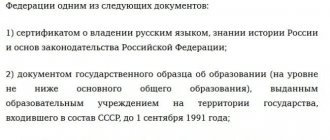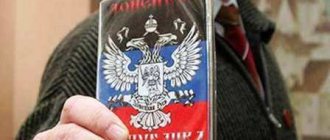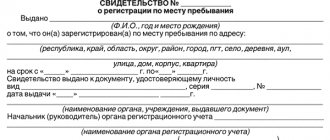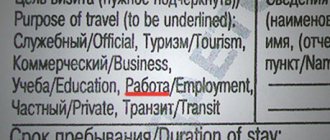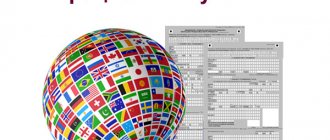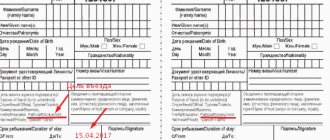Rules for registration of foreign citizens by law
By law, every foreign citizen staying on the territory of Russia must register at the place of temporary residence, which is prescribed in Article 20 of Federal Law No. 109. Regardless of what type of transport a migrant uses to cross the border, he must fill out a migration card before passing through customs control. It consists of two halves, one part is handed over to the person entering, the second remains at customs and is entered into the register.
A migration card allows you to stay in the Russian Federation for up to 90 days. If a foreigner comes to the country for tourism purposes and his stay does not exceed 7 days, he does not need to register. The procedure is free and quite simple. You should contact the regional department of the Central Internal Affairs Directorate and fill out an application. You must have with you the passport with which the foreigner crossed the border and a migration card. Also a prerequisite is the presence of the receiving party - the person giving consent to registration in the personal living space. If a citizen registers in his own living space, the presence of third parties is not necessary.
All these rules are regulated by an appendix to the law (Resolution of the Government of the Russian Federation No. 9 “On the procedure for carrying out migration registration of foreign citizens and stateless persons in the Russian Federation”).
Latest changes made to Federal Law 109
The Federal Law “On migration registration of foreign citizens and stateless persons in the Russian Federation” was adopted by the State Duma on June 30, 2006, and approved on the 7th of the next month after adoption. Also at this time, adjustments were made to Federal Law 79. Details about this are in the article:
The law is aimed at complying with the requirements put forward by the Russian Federation in relation to each resident. In response, the law respects everyone’s rights to move around the country, choose their city of residence, or other freedoms and human rights.
Brief content of Federal Law 109:
- Description of the main provisions of the law;
- Listing of positions of civil servants who are involved in migration registration and determination of their authority;
- Description of the procedure for registering residents from abroad at their place of residence;
- Registration of residents from abroad about their presence on the territory of the Russian Federation;
- Description of the grounds for prosecution in case of violation of Federal Law 109;
- Description of the final provisions.
The latest changes to Federal Law No. 109 were made on November 28, 2015. Amendments were also made to Federal Law 115. Details here:
The following articles have been changed:
St. 20
Subparagraph b, paragraph 1, part 2 of Article 20 has been amended. It states that a foreign resident is not required to register with the government if he is staying in a hotel or receiving medical care. Also, he is not required to register if he visited the Russian Federation to work on a rotational basis.
St. 22
Part 9, Article 22 was changed. It states that the institution in which a particular person resides is obliged to record information about the residence of foreign guests or stateless persons. After recording such data, the authorized employee is obliged to transfer it to the migration registration authority.
Part 10, Article 22 was changed. It states that if a person from abroad arrives at a hotel or other institution, the authorized person is obliged to record the time of arrival and notify the migration registration authority about this. For this purpose, a communication tool can be used in accordance with the requirements put forward by the Government of the Russian Federation.
St. 23
Part 3, Article 23 was changed. If a person with foreign citizenship leaves a hotel or other institution, the administration must notify the migration registration authority within 24 hours.
Part 4, Article 23 was changed. If a citizen with a foreign place of residence is deregistered from a hotel or other institution, the administration is obliged to notify the migration registration authority about this. Modern means of communication may be used in the manner established by the government of the Russian Federation.
You may be interested in: Federal Law 103 with the latest changes for 2021.
Below are the main articles of Federal Law 109:
St. 5
Article 5 describes the rights and interests of a person during migration registration. Residents from abroad can move freely within the Russian Federation. They have the right to stop for a temporary stay in any locality and bear similar responsibilities to citizens of the Russian Federation. Exceptions are cases established by international treaties of the Russian Federation.
The registration procedure is carried out:
- In the customs territory;
- On the territory of a military camp;
- In areas where a special permit is required for the place of stay;
- In areas with a high risk of infection;
- During the war period.
Actions of state bodies in case of their illegality can be appealed in court or other higher authorities.
St. 15
Article 15 describes the reasons that oblige a resident from abroad to register on the territory of the Russian Federation. The reason for registration is the right to be and use specific real estate, which is located in one of the constituent entities of the Russian Federation. To establish such a right, you need to refer to the housing legislation of the Russian Federation.
Registration of a foreign citizen includes a record of information in the form of the foreign citizen's real estate address. Additionally, information is recorded in migration records.
St. 17
Article 17 defines the types and number of documents that will be required when registering a foreign citizen on the territory of the Russian Federation.
Documentation:
- Passport or other identification document of a foreign citizen;
- Temporary residence decision or residence permit document;
- An official permit confirming that a citizen has the right to use real estate.
A foreign citizen may not present a document on the right to use specific real estate if he previously provided this document to a municipal institution. In this case, the migration registration authority independently requests such documents.
What is labor migration?
Labor migration is a type of migration that is associated with the movement of the population in order to find a decent job. Labor migrations are of two types:
- Temporary;
- Permanent.
Labor migration on a permanent basis is a type of movement when citizens want to settle in another country forever. It does not matter what documents they will use to reside in another country - a residence permit or citizenship.
Temporary labor migration. Includes areas of activity such as:
- Fishing in the form of employment;
- Construction;
- Provision of services;
- Harvest, etc.
Temporary labor migration is widely used on the territory of the Russian Federation.
New law on migration registration
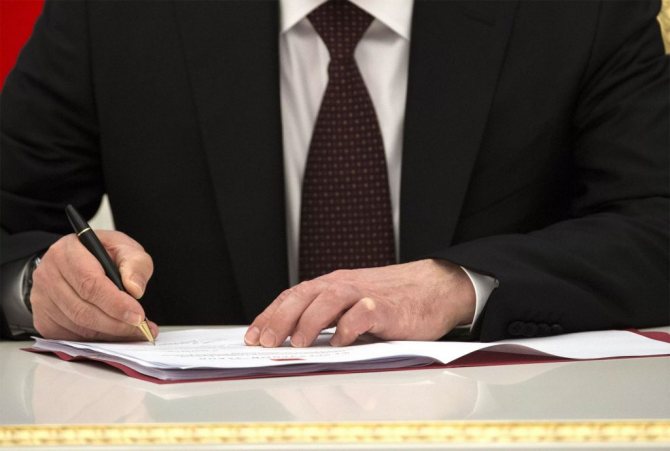
The new law 182-FZ came into force on September 7, 2020. It greatly simplifies the procedure for maintaining migration records. Significant difficulties for many citizens were the rules for registration at the place of residence. New provisions of the law allow all foreign citizens who have a certificate of ownership of this premises to act as a host and register migrants in their own living space.
The changes also affected residents of neighboring countries participating in the state program for the voluntary resettlement of compatriots. Now these categories of citizens, as well as members of their families, may not register with migration authorities for one month.
The law provides for a new rule - foreign citizens must notify migration registration authorities about their stay abroad of Russia. You should do this yourself.
Another innovation should help avoid queues: you can now register or unregister remotely. The application can be submitted using the information system “Unified Portal of State and Municipal Services”, through multifunctional service centers.
Important! When submitting an application electronically, confirmation of registration is a printed detachable part of the form, which is signed with the electronic signature of the responsible employee of the migration registration authorities.
The period given for registration remains 7 working days for all foreign citizens, except for participants in the resettlement program.
Federal Law 109 on migration registration as amended - 2021, foreign citizens, Art. 16
At the present time in the Russian Federation, migration registration of repatriates and stateless persons acts as a form of state regulation of processes in the field of migration, which is aimed at fulfilling guarantees of the rights of persons legally present on Russian soil.
Of course, in our state there is a valid law regulating these relations, and this is Federal Law 109 on migration registration, as amended in 2021. Let's look at this regulatory document.
Basic Concepts
The second article of the document is responsible for the basic terms of the law.
According to its provisions, it is worth highlighting the following main concepts:
- Migration accounting. This is a government activity to systematize and record data on stateless persons and repatriates, as well as on all kinds of movements of these persons.
- Accounting bodies. This is the name of the executive body that is engaged in the implementation of law enforcement functions, and, in addition, control, supervision, and at the same time is engaged in the provision of public services in the field of migration.
- Place of residence is the living space in which a repatriate or stateless person is registered by law.
- Place of residence – living space that does not act as a place of residence.
- The registration procedure according to the place of residence is the recording by authorized structures of data on the repatriate’s stay in a certain place of stay.
- Fictitious registration – registration of a person according to the place of residence by providing certain false documents or incorrect data.
Federal Law 109 on migration registration as amended in 2021
When analyzing in detail the very essence of this law, it reflects the facts that tell about the conduct of migration registration of foreigners and stateless persons in general, and also describes the activities and characteristics of those bodies that are involved in implementing control measures on this issue.
Based on the provisions of this document, migration registration is carried out to achieve the following goals:
- To create certain conditions for Russians to exercise their freedoms along with their rights and fulfill all the responsibilities that are assigned to them under current legislation.
- To implement a certain format of state policy in the field of migration.
- To generate reliable, relevant and timely information about the fact of movement of foreigners. This information is required in order to predict the consequences of these movements and surveillance in the area in question.
- To deal with crisis-type cases.
- Planning the improvement of Russian territory.
- To protect constitutional foundations and the interests of civilians.
- Systematization of all information about repatriates who reside within our state, as well as about their movements.
- Solutions to other problems.
In general, migration registration should be based on principles such as:
- Freedom of movement for foreigners.
- Protection by state forces of the rights of foreigners to freedom of movement and choice of place to stay or live in the country.
- The totality of interests of society, as well as the state as a whole and the individual.
- Availability of execution of actions that are necessary for the actual implementation of registration in the migration sphere.
- Ensuring the national security of the Russian Federation and protecting other national Russian interests.
- Unification of migration provisions.
Migration registration authorities
At this point in time, only two government agencies act as migration registration authorities. This is the Federal Migration Service, and divisions of the Main Directorate for Migration of the Ministry of Internal Affairs.
As for the first organization, it is officially abolished in 2021. However, this service continues to function to this day, and it will be finally disbanded only in 2021.
This means that nowadays stateless people and foreigners have the opportunity to use the services of this institution in order to resolve their own issues that relate to the migration sphere.
The Department of the Main Directorate for Migration of the Ministry of Internal Affairs is currently the main state organization that deals with solving various types of migration issues and problems.
Divisions of this government department are currently located in all Russian regions, therefore, foreigners and Russian citizens themselves have absolutely no problems in resolving migration issues.
Registration at place of residence
This procedure must be carried out through the work of an employee of any of the above regulatory authorities.
To obtain this type of registration, each stateless person or foreigner must have the following documents:
- RVP or residence permit.
- Internal passport.
- Photos.
- International passport.
- Receipt for payment of the duty.
In general, although this registration is permanent, it will have a similar legal status until the foreigner receives permanent residence or Russian citizenship.
After this, the person will need to provide an updated registration, even if he has not changed his place of residence.
Accounting at the place of stay
When it is necessary to consider registration in more detail according to the place of stay, it is important to note the fact that such registration for stateless persons and repatriates will necessarily be temporary.
Moreover, its validity period will be from 3 months to 1 year. Everything will depend on the basis on which the foreigner is registered, as well as according to the migration policy of the region in which the registration will take place.
At the same time, the documents that will be required by MS employees in order for a repatriate to be registered will not differ much from the list that will be necessary for permanent registration.
In accordance with this, each person must pay attention to the fact that the set of these documents is complete, as well as to ensure that the application for registration is established strictly in accordance with all established standards.
Responsibility for violation
As for the liability that comes to stateless persons and repatriates for violations of migration rules, its provisions are described in Article 24 of this law.
According to information from this article, it is worth noting that those persons who act as perpetrators of violations of legislation on registration in the field of migration must necessarily bear responsibility, which is regulated by this legislation.
At the same time, it is necessary to take into account that foreigners who have not been registered according to their place of stay cannot be held liable. An exception would be situations where the foreigner was obliged to report his or her whereabouts.
Final clause
This section of the law in question talks about how the law will be applied to those legal relations that arose before it actually came into force (Article 25).
Foreigners who are registered according to their place of stay at the time the law comes into force are registered under migration registration until the period established by law expires, or until the visa expires.
It is important to keep in mind that foreigners are subject to such migration registration in a situation where their place of stay changes.
Repatriates who have a temporary residence permit and registration according to temporary residence can use the right to register on the day the law comes into force as long as the period of temporary residence permit is valid at the place of residence, if the procedure established by law is followed.
The very last line in this federal law under consideration reflects information regarding the timing of the actual entry into force of the law.
Accordingly, the effective date is January 17, 2017. Thus, at the present time the law is valid.
The law bans foreign citizens from entering the Russian Federation. Find out here.
Where to start immigrating to Australia from Russia? More details here.
In general, the changes in this law affected most of the most pressing problems for foreigners - registration of any type and nature.
If stateless persons and repatriates refer to the provisions of this law in order to understand the nature of registration in the Russian Federation as a whole, then it will be much easier for them to complete this procedure.
Order of the Ministry of Internal Affairs of the Russian Federation No. 856 “On approval of the Administrative Regulations for Migration Registration”
Order No. 856 (12/10/2020) determined the procedure for providing public services on migration issues, registration of foreign citizens and stateless persons with migration registration. The order approved new application forms for notification of arrival:
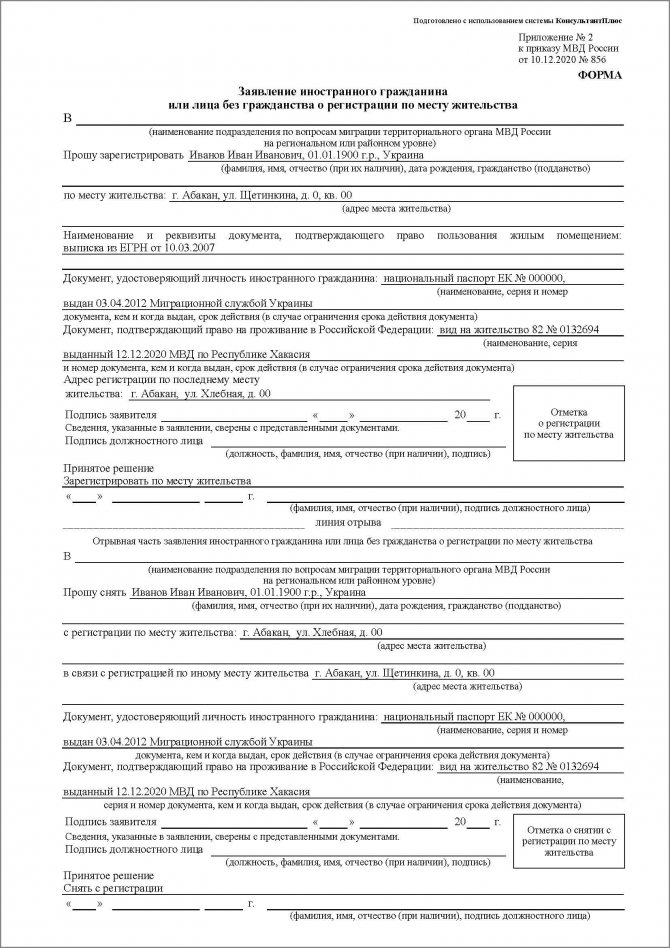
Application for registration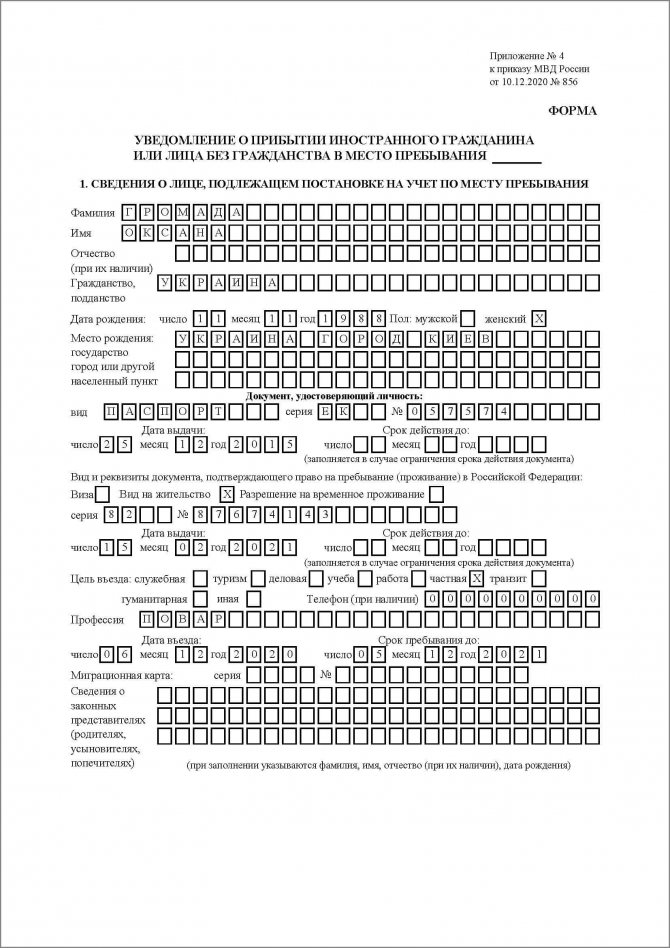
Arrival Notification
The filling requirements remain the same: all fields must be filled out in clear, legible handwriting. The lower, detachable part is filled in by the responsible employee. Registration is considered valid only if there are signatures and seals, as well as a note that the receiving party confirms its consent to registration and that the foreign citizen has completed all the actions required by law that are necessary for registration.
Important! The long-known truth “ignorance of the law is no excuse from responsibility” is still relevant. We advise migrants to monitor changes in rules.
Migration registration authorities
There are authorities authorized to permanently register immigrants on the territory of our state. There are also additional authorities that provide all possible assistance within their competence.
The main executive body has the following powers:
- Monitoring compliance with the rules for obtaining registration by immigrants, as well as interested persons;
- Providing all possible assistance in coordinating actions by other authorities;
- Timely correction of information in existing bathhouse databases, as well as provision of reliable information to relevant departments.
If the case concerns a territorial authority responsible for registering immigrants, then the possibilities are as follows:
- Marking immigrants' documents;
- Transfer of information about collected statistical data;
- Registration of arriving immigrants;
- Providing documents to the court on cancellation of registration;
- Providing data on foreign citizens to the tax office;
- Monitoring compliance with Russian legislation by stateless persons;
- Entering information about registration and registration at the place of arrival into the database.
The following executive bodies can also carry out registration of foreign citizens:
- Heads of diplomatic missions or consulates, as well as employees of these organizations;
- Officials of the Ministry of Internal Affairs;
- Federal executive authorities.
See how to obtain a labor patent for work for foreign citizens. Migration to Australia from Russia, what are the requirements? The answer is here.
Application forms and samples
Application form for a foreign citizen for registration at the place of residence (257 Downloads) Form for notification of the arrival of a foreign citizen at the place of stay (537 Downloads) Application for deregistration of a foreign citizen from registration at the place of residence (16 Downloads) Form for notification of the departure of a foreign citizen from the place of stay ( 117 Downloads)
Sample application of a foreign citizen for registration at the place of residence (1660 Downloads) Sample notification of arrival of a foreign citizen (192 Downloads) Sample notification of arrival (hosting party individual) (One Download) Sample notification of arrival (hosting party legal entity) ( 62 Downloads) Sample notification of arrival (host of a foreign citizen) (110 Downloads) Sample of filling out an application for deregistration of a foreign citizen from registration at the place of residence (19 Downloads) Sample of filling out a notice of departure of a foreign citizen from the place of stay (80 Downloads)
What changes has COVID-19 brought with it?
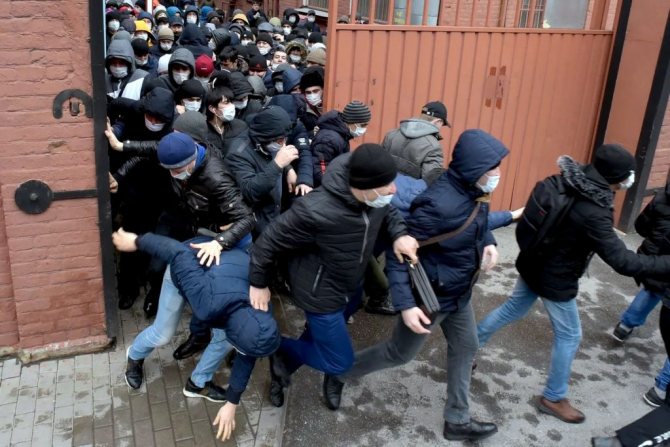
The pandemic could not but affect migrants. Many people find themselves in a situation where their registration expires and they are unable to travel to their country. The migration registration system in the Russian Federation is very loyal to foreign citizens who comply with the laws of the country. President of the Russian Federation V.V. Putin issued Decree No. 791 (December 15, 2020).
It must solve the problems of migrants, because this is what its action is aimed at. Thus, according to the provisions of the order, the validity of previously issued documents is suspended: visas, migration cards (with mandatory registration), temporary residence permits, residence permits, certificates of participants in the resettlement program, refugee documents, etc.
The validity of these documents has been extended until June 15, 2021. Penalties against those persons who violated the permissible deadlines for leaving the country have also been canceled.
Registration at place of residence
A citizen who has the right to permanent or temporary residence in the territory of the Russian Federation is required to register at the address of presence. If a stateless person has rights to use living space, then he is obliged to obtain permanent or temporary registration there.
The information must be recorded on the residence permit or temporary residence permit.
The registration process is quite simple: the application is submitted to the local migration registration authorities according to the territorial affiliation of the apartment address.
The following package of documents will be required:
- Documents that confirm the citizen’s rights to use the available living space;
- Identification documents;
- A document confirming the right of temporary stay on the territory of the Russian Federation;
The grounds for removal of a foreign citizen may be:
- Departure from life;
- Establishing the fact of fictitious registration;
- Termination of documents confirming the right to temporary residence;
- Cancellation of rights to use living space.
The information must be included in the relevant documents of the foreign citizen.
What is the purpose of migration registration?
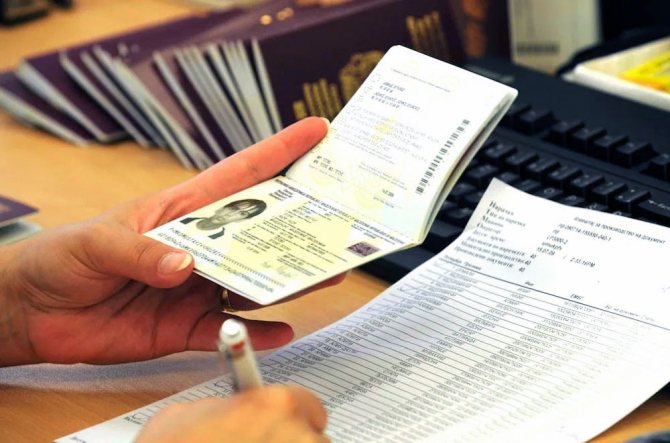
The state is obliged to take care of its citizens, as well as persons temporarily residing on its territory. Registration of foreigners arriving in the country is carried out in order to:
- have the opportunity to create the necessary conditions that will allow the rights and freedoms of foreign citizens to be realized;
- carry out checks on the fulfillment by migrants of the duties that they receive along with the rights;
- have grounds for the development and subsequent successful implementation of state policy in the migration sphere;
- conduct statistical observation;
- take effective management in the event of an emergency;
- for the purpose of further planning the development of regions of the Russian Federation.
Failure to comply with the above laws and regulations may result in administrative penalties.
MIGRATION REGISTRATION OF CITIZENS. The law has come into force! 09/07/2020 Migrants. Migration lawyer. advocate.
